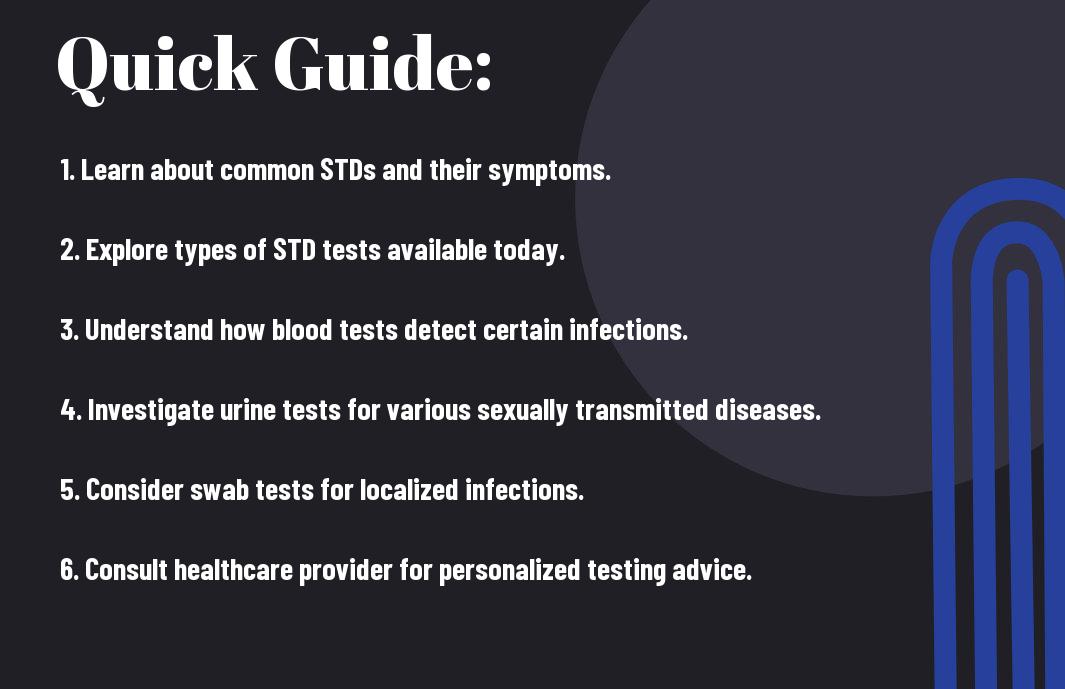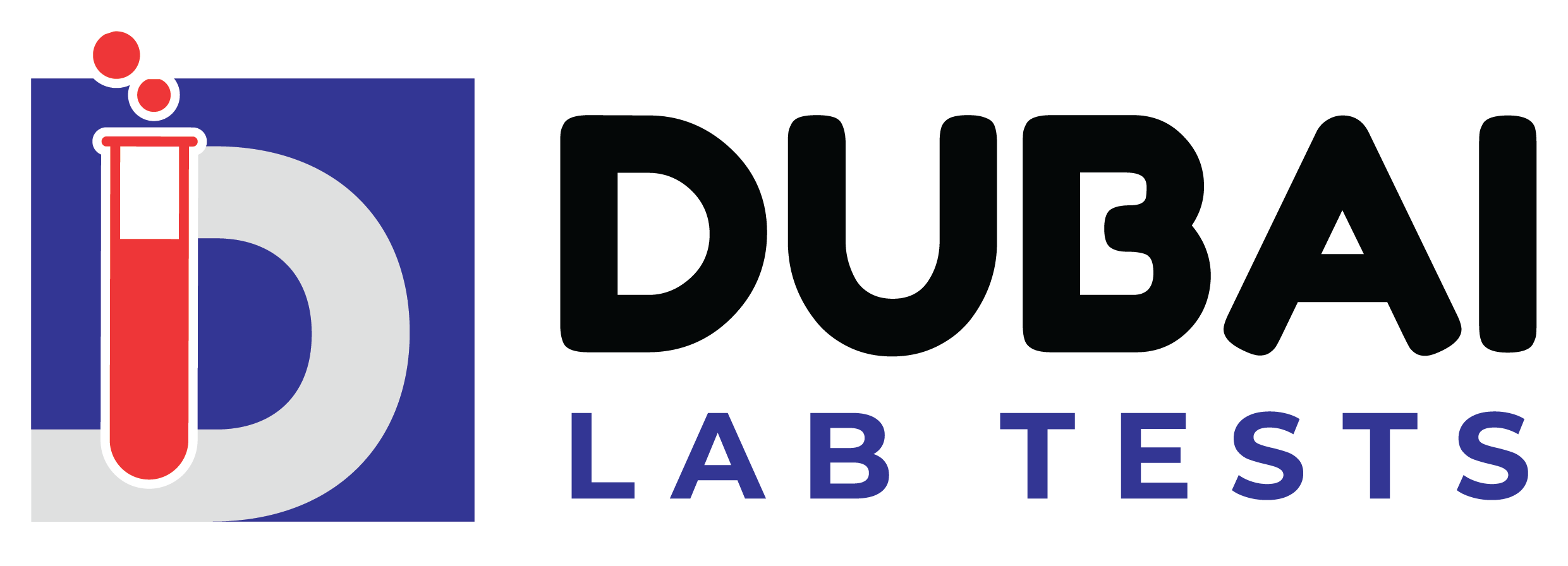There’s a lot to consider when it comes to your sexual health, and understanding the various types of STD tests available can empower you to make informed decisions. This guide will walk you through the different tests, what they can detect, and when you should consider getting tested. Whether you’re experiencing symptoms or simply prioritizing your health, knowing the facts can help you take control of your well-being. Equip yourself with knowledge so you can effectively communicate with your healthcare provider and take proactive steps towards a healthier future.
Key Takeaways:
- Types of Tests: There are various types of STD tests, including blood tests, urine tests, and swabs, each suited for detecting different infections.
- Testing Frequency: Regular testing is important for sexually active individuals, especially if they have multiple partners or engage in unprotected sex.
- Symptoms vs. Asymptomatic: Many STDs can be asymptomatic, which stresses the importance of getting tested even without noticeable symptoms.
- Results Interpretation: Understanding how to interpret test results is imperative, as false positives and negatives can occur.
- Consultation with Healthcare Provider: Discussing testing options and results with a healthcare provider can provide tailored guidance and support.


Understanding the Different Types of STD Tests
Before choosing an STD test, it’s imperative to understand the various options available to you. Here’s a quick overview of the types of tests:
| Molecular Tests | Detects the presence of the virus’s genetic material. |
| Antibody Tests | Identifies antibodies your body produces in response to an infection. |
| Antigen Tests | Detects specific proteins from the virus. |
| Rapid Tests | Provide results within minutes. |
| Combination Tests | Combine antibody and antigen detection for comprehensive results. |
This knowledge can help guide your decision on which test suits your needs best.
Molecular Tests
One of the most advanced methods for detecting STDs, molecular tests analyze the genetic information of the viruses or bacteria present in your body. This type of testing is often highly accurate and can identify infections at very early stages, making it a vital tool for timely treatment.
Antibody Tests
You can evaluate your immune response to certain STDs through antibody tests. These tests measure the presence of antibodies produced by your body after exposure to an infection, helping to determine if you have been infected.
Types of antibody tests include enzyme-linked immunosorbent assays (ELISA) and rapid tests, which provide quick results. While antibody tests are effective for some infections, they may take time to yield positive results after exposure. In particular, the HIV antibody test is a critical part of regular health screenings.
Antigen Tests
Antibody tests focus on identifying specific proteins produced by an infection. Antigen tests can detect these proteins directly in your sample, offering a different approach to diagnosis compared to antibody tests.
Tests for chlamydia and gonorrhea commonly employ this method. Antigen tests provide results rapidly, making them particularly useful in environments where immediate diagnosis is imperative. However, it is important to consult with your healthcare provider about the appropriate use of these tests for effective STD testing.
Step-by-Step Guide to Getting Tested
Some people may feel anxious about getting tested for STDs, but understanding the process can help ease your mind. Below is a concise breakdown of steps involved in getting tested:
| Step | Description |
| 1. Find a Testing Location | Locate a clinic or healthcare provider that offers STD testing. |
| 2. Schedule an Appointment | Contact the facility to book a time that works for you. |
| 3. Prepare for Your Test | Follow any specific instructions the clinic provides. |
| 4. Get Tested | Attend your appointment and undergo the necessary tests. |
| 5. Receive Your Results | Contact the clinic for your results and discuss next steps. |
Preparing for Your Test
Preparing for your test is important to ensure accurate results. You might be given specific instructions, such as fasting or avoiding certain medications prior to testing. It’s best to follow these guidelines closely to help make your testing experience as smooth as possible.
What to Expect During Testing
Some testing procedures may seem intimidating, but understanding what to expect can alleviate your concerns. You will typically have a consultation prior to your tests, during which a healthcare provider will ask about your symptoms and sexual history.
Testing may involve a simple urine sample, blood draw, or swab depending on which STDs are being tested for. In many cases, the process is quick and not painful. During this time, be honest and open with your provider for accurate testing. The healthcare team is there to support you and ensure your comfort throughout the process. Afterward, await the results, which could take a few days, and don’t hesitate to ask any questions you may have while at the clinic.
Factors Influencing Your Choice of Test
After considering various aspects of your health and lifestyle, several factors may influence your choice of STD testing. These factors include:
- Personal risk factors
- Timing of potential exposure
- Presence of symptoms
After evaluating these elements, you can make a more informed decision about which test is most suitable for you.
Risk Factors
Factors influencing your decision often relate to your personal circumstances. Consider the following:
- Number of sexual partners
- Type of protection used
- History of STDs
Thou should evaluate your risk to better determine which tests may be necessary for your health.
Timing of Tests
While timing can significantly impact the accuracy of your test results, knowing when to get tested is imperative. Choose to test at the right intervals based on your sexual activity and potential exposure to STDs, ensuring you’re not testing too early or too late for accurate results.
A general guideline is to wait at least 1-2 weeks after potential exposure to allow the body to produce detectable antibodies or viral RNA. Some STDs may require longer waiting periods for accurate results, so familiarize yourself with testing guidelines specific to each infection.
Symptom Presentation
Timing your test based on the appearance of symptoms is also important. It is imperative to recognize that some STDs can be asymptomatic, meaning you may not exhibit any signs despite being infected. Symptoms can range from mild to severe and include:
- Painful urination
- Unusual discharge
- Genital sores
It is vital to seek testing even if you feel fine, as early detection is key to effective treatment and preventing complications or spreading STDs to partners.
Tips for Effective Testing
To ensure a smooth and accurate experience during your STD testing, consider these tips:
- Choose the right time for testing, ideally after a potential exposure.
- Know which type of tests you need for your sexual history.
- Follow any pre-test instructions provided by your healthcare provider.
- Keep track of your results and follow up as necessary.
Recognizing the importance of regular screenings can significantly impact your health—read more in A Guide to Regular STI Screenings.
Finding a Testing Center
Testing centers for STDs are available in various locations, including clinics, hospitals, and private facilities. To find one, consider researching online for local health services or contacting your healthcare provider for recommendations. Ensure the center offers the specific STD tests you need, and check if appointments are required, which can help reduce wait times.
Communicating with Your Healthcare Provider
For a productive conversation with your healthcare provider, be open about your sexual history, risk factors, and any symptoms you’ve experienced. This transparency ensures they recommend the most appropriate tests for you and maintain your trust. Discussing your concerns allows your provider to give you the best advice and support for STD prevention and treatment options.
With effective communication, you can build a strong partnership with your healthcare provider, leading to better health outcomes. Don’t hesitate to ask questions, seek clarity on test results, and understand the implications of your choices. Your provider can offer resources and support tailored to your needs, ensuring you make informed decisions about your sexual health. Prioritizing this dialogue helps you stay proactive in maintaining your well-being.
Pros and Cons of Various STD Tests
Unlike other health tests, STD tests come with their own set of benefits and drawbacks. It’s necessary to understand these factors to make an informed decision about your health.
Pros and Cons of Different STD Tests
| Pros | Cons |
|---|---|
| Quick results from rapid tests | Possible false negatives |
| Convenience of at-home testing | Limited availability of some tests |
| Comprehensive results from blood tests | Higher costs for certain tests |
| Increased access to care | Some tests require multiple visits |
| Anonymity in testing | Emotional stress from results |
| Early detection of STDs | Potential discomfort from procedures |
Advantages of Each Test Type
Even though each STD test type has its own characteristics, they all offer unique advantages tailored to different situations. Rapid tests give you quick results, while at-home tests provide privacy. Blood tests are thorough and can detect multiple STDs simultaneously, while cultures often offer definitive results for bacterial infections. By considering your specific needs, you’ll find the best testing option for maintaining your sexual health.
Limitations and Considerations
The various types of STD tests come with their own limitations that you should evaluate carefully. What might seem like an ideal solution could have drawbacks that impact your decision-making.
Cons of STD tests can vary significantly based on the method chosen. While some tests provide rapid results, they may also yield false negatives, which could lead you to believe you’re STD-free when that’s not the case. Additionally, at-home tests are convenient but may lack the accuracy of professionally administered tests. Blood tests, though comprehensive, might also cause emotional strain due to their higher costs and the need for multiple visits. It’s vital to weigh these factors to ensure you’re making the best decision for your health.
Frequently Asked Questions About STD Testing
All your concerns about STD testing can be addressed with some common questions. You may wonder how often you should get tested; it’s advised to test at least once a year, or more frequently if you have multiple partners. Knowing your status is vital for your health and that of your partners. You might also be curious about the testing process; many tests require just a simple blood or urine sample. Early detection can lead to better treatment outcomes, so don’t hesitate to seek testing if you have any doubts.
Summing up
Now that you have a comprehensive understanding of the different types of STD tests available, you can make informed decisions regarding your sexual health. Choosing the right test means recognizing your personal risk factors and understanding the symptoms you may encounter. By staying knowledgeable about testing options, you empower yourself to take proactive steps in maintaining your health and well-being. Regular testing and open communication with your healthcare provider can lead to earlier detection and better outcomes for you and your partners.
Q: What are the different types of STD tests available?
A: There are several types of STD tests, including blood tests, urine tests, and swabs from affected areas. Blood tests are commonly used for infections like HIV and Syphilis, while urine tests are often used for Gonorrhea and Chlamydia. Additionally, swabs may be taken from the genital or oral areas to test for Herpes and other infections.
Q: How often should I get tested for STDs?
A: The frequency of STD testing depends on various factors such as your sexual activity, number of partners, and whether you engage in unprotected sex. Individuals with multiple partners or those who have unprotected sex should consider getting tested at least once a year. It’s advisable to consult with a healthcare professional for personalized recommendations.
Q: How can I prepare for an STD test?
A: Preparation for an STD test varies depending on the type of test. For blood tests, no specific preparation is usually necessary, but for urine tests, it may be recommended to avoid urinating for at least one hour before the test. Always follow your healthcare provider’s instructions and ask any questions if you’re unsure about the testing process.
Q: What can I expect during a typical STD testing appointment?
A: During an STD testing appointment, you will typically have a discussion with your healthcare provider about your sexual health history and any symptoms you may be experiencing. The actual testing process usually involves either a blood draw, urine collection, or taking a swab. The entire process is generally quick and straightforward, often taking less than an hour.
Q: How long does it take to get results from STD tests?
A: The time it takes to receive STD test results can vary widely based on the type of test performed and the laboratory processing the samples. Some tests, like rapid HIV tests, can provide results within minutes, while others, such as blood tests for Syphilis, may take a few days. Your healthcare provider should give you an estimate of when you can expect results after testing.



